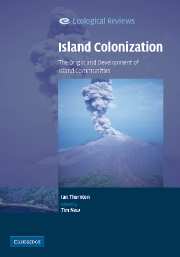Book contents
- Frontmatter
- Contents
- Editorial preface
- Acknowledgements
- PART I Theoretical and experimental studies
- PART II Natural recolonization after devastation
- PART III The recolonization of devastated islands
- PART IV Assembly of biotas on new islands
- PART V Colonization and assembly
- 14 Dispersal
- 15 Stepping stone islands: the case of Sebesi
- 16 Learning from nature's lessons
- References
- Index
14 - Dispersal
Published online by Cambridge University Press: 12 January 2010
- Frontmatter
- Contents
- Editorial preface
- Acknowledgements
- PART I Theoretical and experimental studies
- PART II Natural recolonization after devastation
- PART III The recolonization of devastated islands
- PART IV Assembly of biotas on new islands
- PART V Colonization and assembly
- 14 Dispersal
- 15 Stepping stone islands: the case of Sebesi
- 16 Learning from nature's lessons
- References
- Index
Summary
Because of differential dispersal ability in the putative source biota, colonization rate and extent of any island is obviously influenced by the degree of isolation. Thus, the sea surrounding the Krakataus acts as a biological filter. At one extreme, it may assist dispersal. It is a highway for organisms like the mangrove Lumnitzera and many beach and coastal trees and shrubs, such as Hibiscus, Terminalia and Casuarina, that have buoyant seeds. The fact that the route to be traversed is over salt water is of no consequence in the case of small, light, fern spores or the minute balloon-like seeds of orchids, whose dispersal range is well above the distance to be covered. The stretch of sea is a partial barrier, of varying intensity, for some other anemochorous (air-dispersed) plant propagules, and for swimming or rafting animals like the large monitor, or geckos, rats and arboreal termites. For swimmers, of course, the travel distance may be an important limitation. Dispersal across Sunda Strait is also more likely in the case of some flying vertebrate species (and the organisms that they carry) and winged insects than others. The sea is virtually a complete barrier to species such as heavy-seeded primary forest trees, amphibians and large terrestrial mammals. The only amphibians known from Sebesi Island, between the Krakataus and Sumatra, are a frog, Rana cancrivora, and a toad, Bufo melanostictus, both of which are associated with people, with the first used as a source of food (there have been permanent inhabitants of Sebesi for some decades).
- Type
- Chapter
- Information
- Island ColonizationThe Origin and Development of Island Communities, pp. 205 - 217Publisher: Cambridge University PressPrint publication year: 2007



